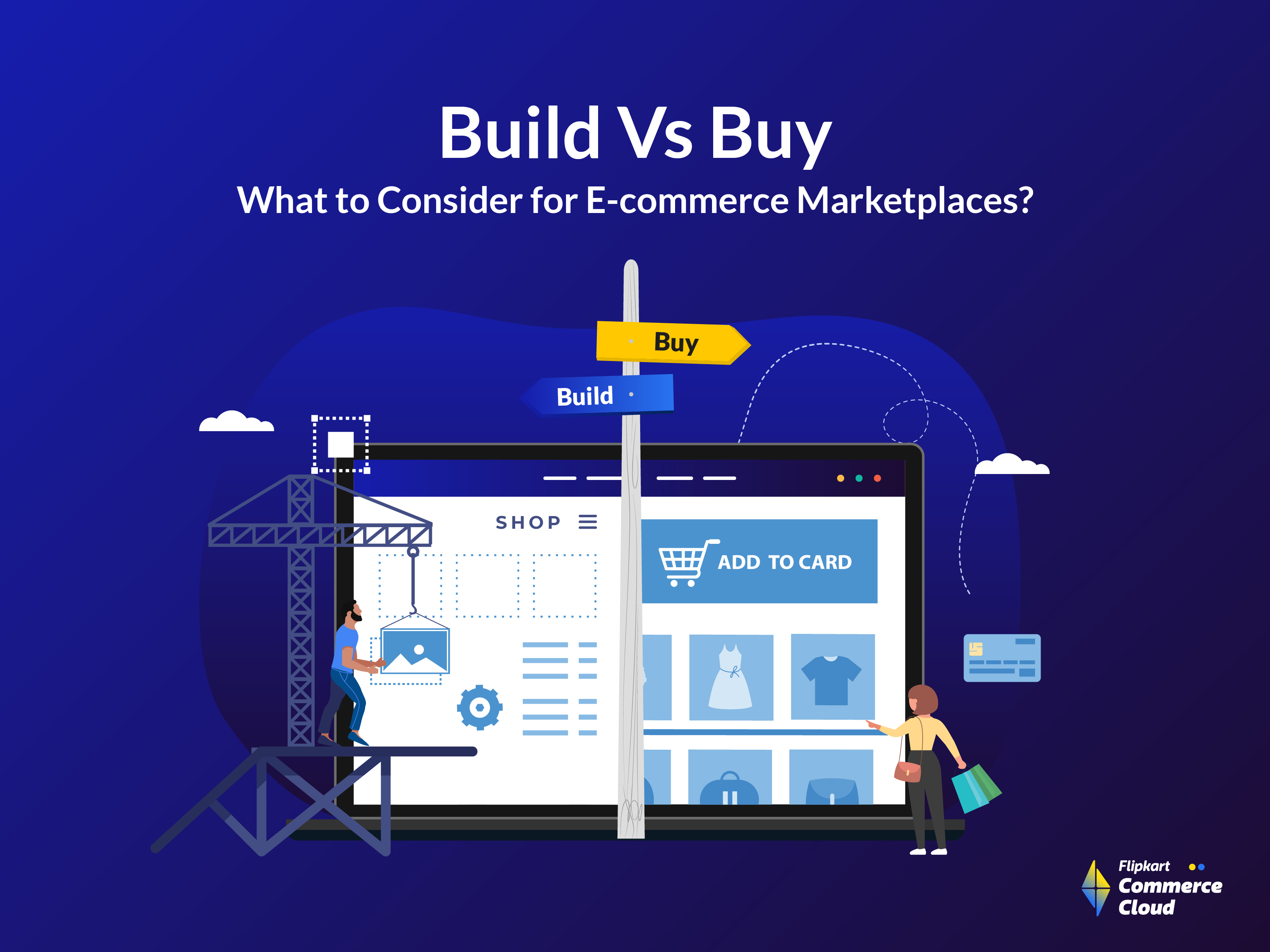
Build vs Buy: What Should You Consider For Your E-commerce Marketplace?
By Flipkart Commerce Cloud
Share On:
With over 35% of customers shopping from online marketplaces, as a retailer, having your own retail platform is a strategic necessity to drive business growth. As the competition becomes fiercer and the need to optimize costs takes precedence, you must understand if you would like to build a marketplace or buy one.
Choosing to build a marketplace offers the flexibility to customize every aspect of the platform, whereas buying a pre-built solution can get you to market faster at a lower upfront cost.
This blog explores different factors affecting the cost of having a marketplace and various crucial aspects of the build vs buy marketplaces decision. Keep reading to learn more.
What is a Marketplace?
An online marketplace is a virtual meeting place that brings a vast number of sellers and buyers together, facilitating transactions between them.
As a business owner, you can offer your target buyers a variety of products without being limited to only one supplier. While the onus of order fulfillment lies on the seller, you manage the platform and also determine its scale in terms of operations, product range and revenues.
Marketplaces can be categorized into various types based on different criteria. Here are some of the common types of marketplaces
|
Based on the Business Model |
||
|
Type of Marketplace |
Description |
Examples |
|
Vertical |
These marketplaces specialize in a single type of product or service but cater to many different sellers. |
Biblio and Dribble |
|
Horizontal |
They provide a wide selection of products or services across different categories, but they share a common characteristic. |
Wayfair and Chewy |
|
Based on Participants |
||
|
Business-to-Consumer (B2C) |
They connect businesses directly to consumers, offering a vast selection of products. |
Walmart and Flipkart |
|
Business-to-Business (B2B) |
These marketplaces facilitate transactions between businesses, often for wholesale goods or services. |
Alibaba and Grainger |
|
Consumer-to-Consumer (C2C) |
They enable individuals to buy and sell directly to each other, creating a used goods marketplace. |
eBay and Craigslist |
How Much Does It Cost to Build a Marketplace?
Here is an analysis of estimated online marketplace development costs based on the project scope:
- Small Marketplace Project: For a basic online store for buying and selling a single type of product or service, the investment ranges anywhere between $100,000–$125,000. This usually covers essentials like a user-friendly interface, secure payment methods, and basic seller and buyer features like a dynamic shopping cart.
- Medium-Complexity Project: For a platform that features a variety of products from different sellers, the cost could be between $140,000 and $200,000. This can include additional features like seller ratings and reviews, advanced search and filtering, faster payment processing, and some level of customization for sellers.
- Complex Marketplace: For a marketplace with advanced features and the latest technologies, the cost could start at $350,000. This could include key features like AI-powered recommendations, live chat support, advanced analytics for sellers, latest payment system, and integrations with external systems.
The figures shared above are estimates only. Factors like project scope, marketplace type, technology stack, and design requirements directly impact the actual cost
Factors that Affect the Cost of Building a Marketplace
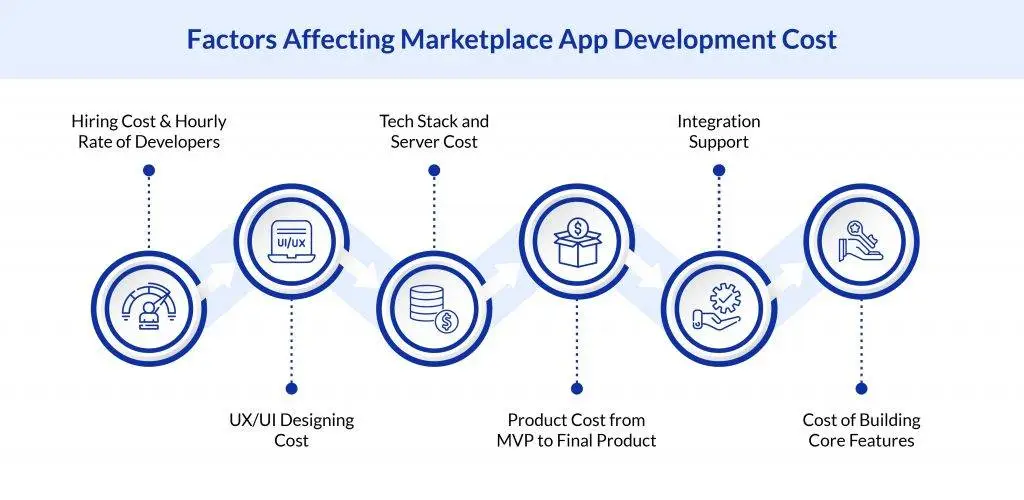
When you are contemplating whether you should build your marketplace from scratch or buy a prebuilt solution, here are the factors you should consider:
Hiring Cost and Hourly Rate of Developers
Building an in-house marketplace requires a team of technical experts, including developers, data scientists, and IT professionals. The hiring cost can vary based on the expertise and experience. For instance, a senior developer with extensive experience in marketplace development will command a higher salary than a junior developer.
Moreover, If you are hiring full-time resources, you also need to consider benefits like healthcare and social security. These costs can add up quickly, especially if the website development process takes longer than expected.
UX/UI Designing Cost
A well-designed ecommerce website will bring conversion and attract customers to return for more purchases.
The cost of UX/UI design can vary greatly depending on several factors. The complexity of the design, the number of pages, and the level of customization required all add to the overall cost.
Tech Stack and Server Cost
The technology stack you choose for your marketplace platform can significantly impact the product development cost. You need to consider the following factors when making your decision:
- Complexity of your marketplace: A simple marketplace with basic functionalities like product listings and transactions will require a less complex tech stack compared to a platform with advanced features like social interaction, in-app chat, or complex search filters.
- Scalability needs: You need to choose technologies that can handle growth in user base and traffic. Consider cloud-based solutions that can easily scale up or down as your marketplace demands change.
- Development expertise: If your in-house development team has experience with a particular technology stack, it might be more cost-effective to use that stack rather than learning a new one.
- Cost of development tools and licenses: Some technologies require paid licenses or subscriptions, which can add to your development cost. There are also open-source options available that can be more cost-friendly.
In addition to the technology stack, server costs also play a role in your overall expenditure. Cloud-based hosting options offer a pay-as-you-go model, which can be more cost-effective for marketplaces with fluctuating traffic.
Integration Support
Integrations with external systems and services can add complexity and cost to your project. For instance, integration with payment gateways, shipping services, or third-party APIs, requires time and expertise to be implemented correctly.
These integrations need to be maintained and updated regularly to ensure smooth operation and security. So, you must factor in the cost of integration support to determine the final cost of your marketplace business.
Core Features
The core features of your marketplace, such as product listings, search and filtering, user profiles, and ratings and reviews, must function smoothly.
The complexity and number of these features can significantly impact the cost of building your marketplace. For example, a feature-rich online platform with advanced search capabilities and personalized recommendations will be more expensive to build than a basic marketplace with limited features. You must identify the core features that your users need and balance them with your budget and business goals.
Pros & Cons of Building a Custom Marketplace
Pros of building your own marketplace
- Full Control and Customization: Building your own marketplace software gives you the flexibility to customize different features of the platform to perfectly match your vision and brand identity. You can design the user interface, define the user experience, and implement features that align with your business strategy.
- Scalability for Future Growth: A custom-built marketplace can be designed with scalability in mind. As your business grows, your marketplace can be adapted to accommodate increased traffic, more sellers, a wider range of products, and expanded geographical coverage.
- Unique Features: With a custom-built marketplace, you have the opportunity to develop unique features that cater to your specific niche or target market. These could be innovative search capabilities, personalized recommendations, or specialized seller tools that set your marketplace apart from the competition.
Cons of building your own marketplace
- Significant Time and Resource Investment: Building a custom marketplace requires a significant investment of time and resources. From conceptualization to development to testing, each stage demands careful planning and execution. This can lead to a longer time-to-market, which might not be ideal if you operate in a fast-paced and competitive environment.
- High Upfront Cost: The financial investment needed to develop a custom marketplace is substantial. This includes the expenses incurred for hiring designers, developers and project managers. You also need to invest in necessary software and hardware, and essential security measures. These costs can add up quickly, making the ‘build’ option a costlier proposition.
- Dependence on Skilled Development Team: The success of your custom marketplace depends on the skills and expertise of your development team. Whether you outsource to a third party or opt for an in-house team, you need a team that can effectively translate your vision into a user-friendly platform.
- Ongoing Maintenance Requirements: A custom marketplace requires continuous updates, bug fixes, and security measures to maintain its functionality and security. This means you must invest in an ongoing maintenance plan, adding to the total cost of ownership
Pros & Cons of Buying a Pre-made Marketplace Solution
Pros of Buying a Pre-made Marketplace Solution
- Faster Time to Market: Pre-made solutions offer a significant advantage in launching your marketplace quickly. Unlike building from scratch, which involves extensive development and testing phases, pre-made solutions are ready-to-use platforms that can be set up and launched in a relatively short time.
- Lower Upfront Costs: Buying a pre-made solution typically requires a lower initial investment compared to building a custom platform. The cost of a pre-made solution includes the platform license or subscription fee, which is often less than the cost of hiring a development team and building a marketplace from scratch.
- Proven Functionality and Features: Pre-made solutions come with a set of features that have been tested and proven to work effectively. This means you can leverage these features to provide a seamless user experience right from the start. There is no need to invest time and resources in developing and testing these features yourself.
- Ongoing Support from the Vendor: When you buy a pre-made solution, you get access to continuous maintenance and customer support services from the vendor. This can include technical support, regular updates, and security patches, which can be invaluable in ensuring the smooth operation of your marketplace.
Cons of Buying a Pre-made Marketplace Solution
- Vendor Lock-In and Potential Future Costs: When you buy a pre-made solution, there’s a risk of vendor lock-in. You might face additional costs associated with upgrades or scaling within the vendor’s ecosystem. Moreover, switching to a different platform in the future could be costly and time-consuming.
- Reliance on the Vendor for Updates and Security: With a pre-made solution, you are dependent on the vendor for timely updates, bug fixes, and ensuring robust security measures. Any delay or inadequacy on their part could impact your marketplace’s performance and security. With FCC, all these issues are taken care of as the team understands the importance of protecting your customers’ Personally Identifiable Information (PII) data. We employ industry best practices and adhere to strict data privacy regulations to safeguard this sensitive information.
Conclusion
While deciding on build vs buy marketplaces solutions, there’s no one-size-fits-all answer. The best way forward depends on your resources, needs, and goals. However, a balanced approach that combines the best of both worlds is ideal.
Buy investing in a platform that offers all back-end functionalities needed to maintain e-commerce while giving you a robust front end to customise your retail store is ideal
Flipkart Commerce Cloud (FCC) offers comprehensive marketplace solutions that support this balanced approach. With FCC, you can benefit from the robust backend solutions tested every day at Flipkart. You still have the freedom to customize the front-end to create a unique shopping experience for your customers.
Book a consultation with our team of experts to know how we can help you build your own marketplace!
More Blogs
See how retailers and brands are winning with FCC
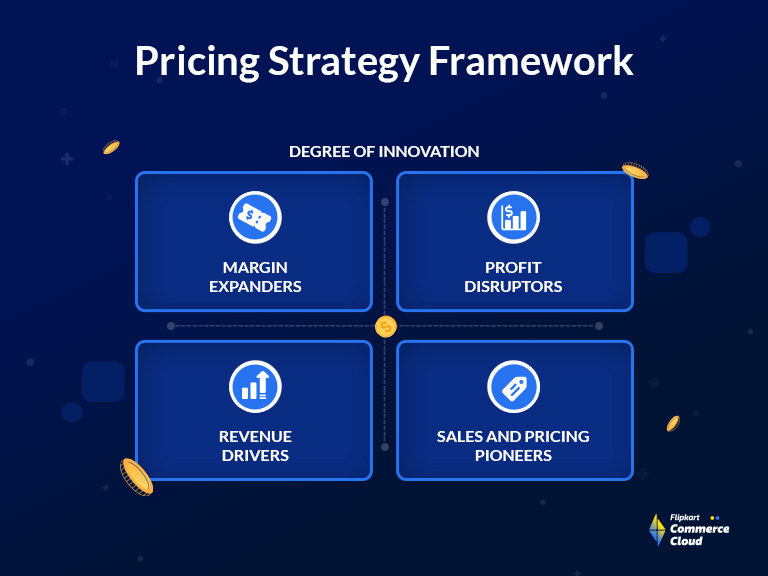
Mastering Pricing Strategy Framework
Read More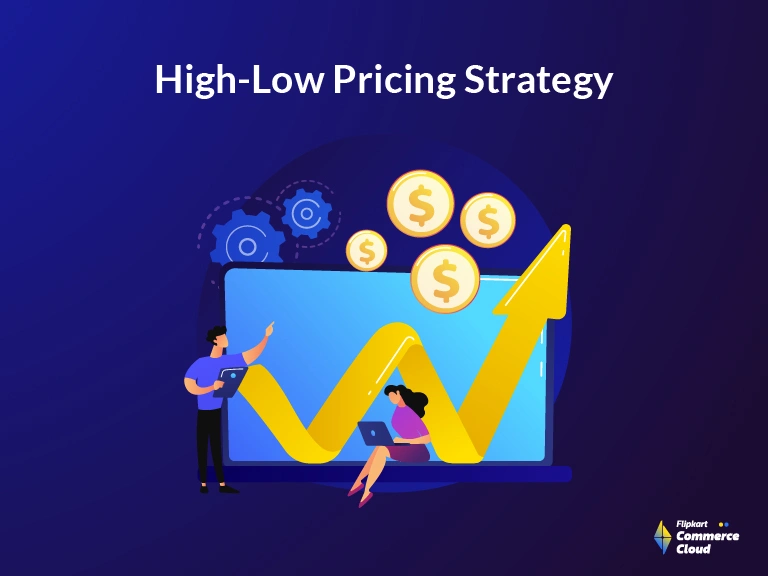
What is a High-Low Pricing Strategy?
Read More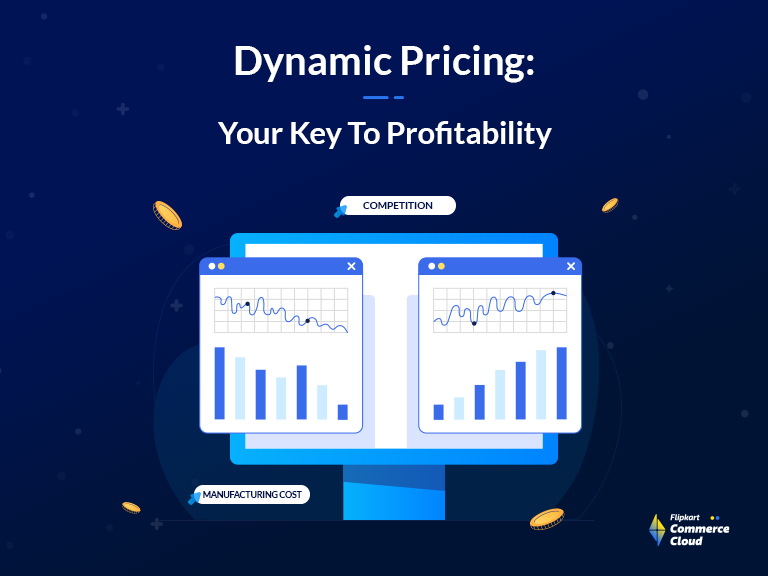
Ultimate Guide To Dynamic Pricing Strategy In 2025
Read More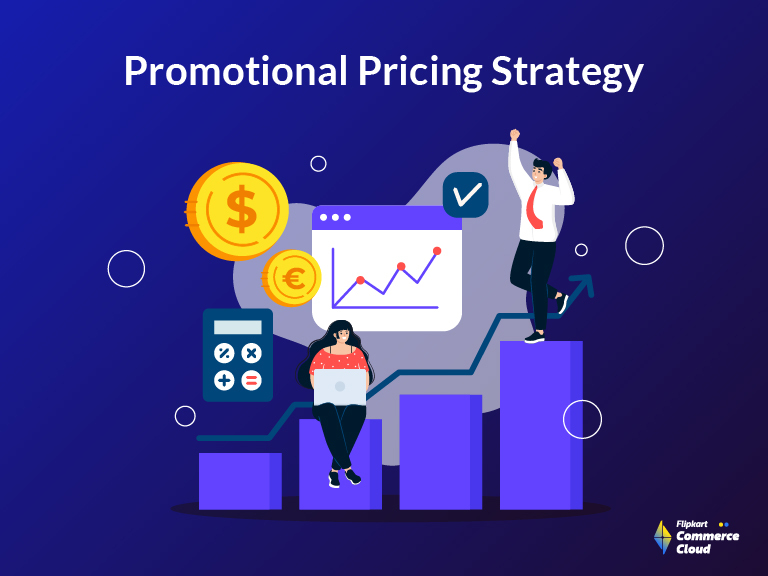
Retail Pricing Strategies: Winning with Promotion Pricing in Competitive Markets
Read More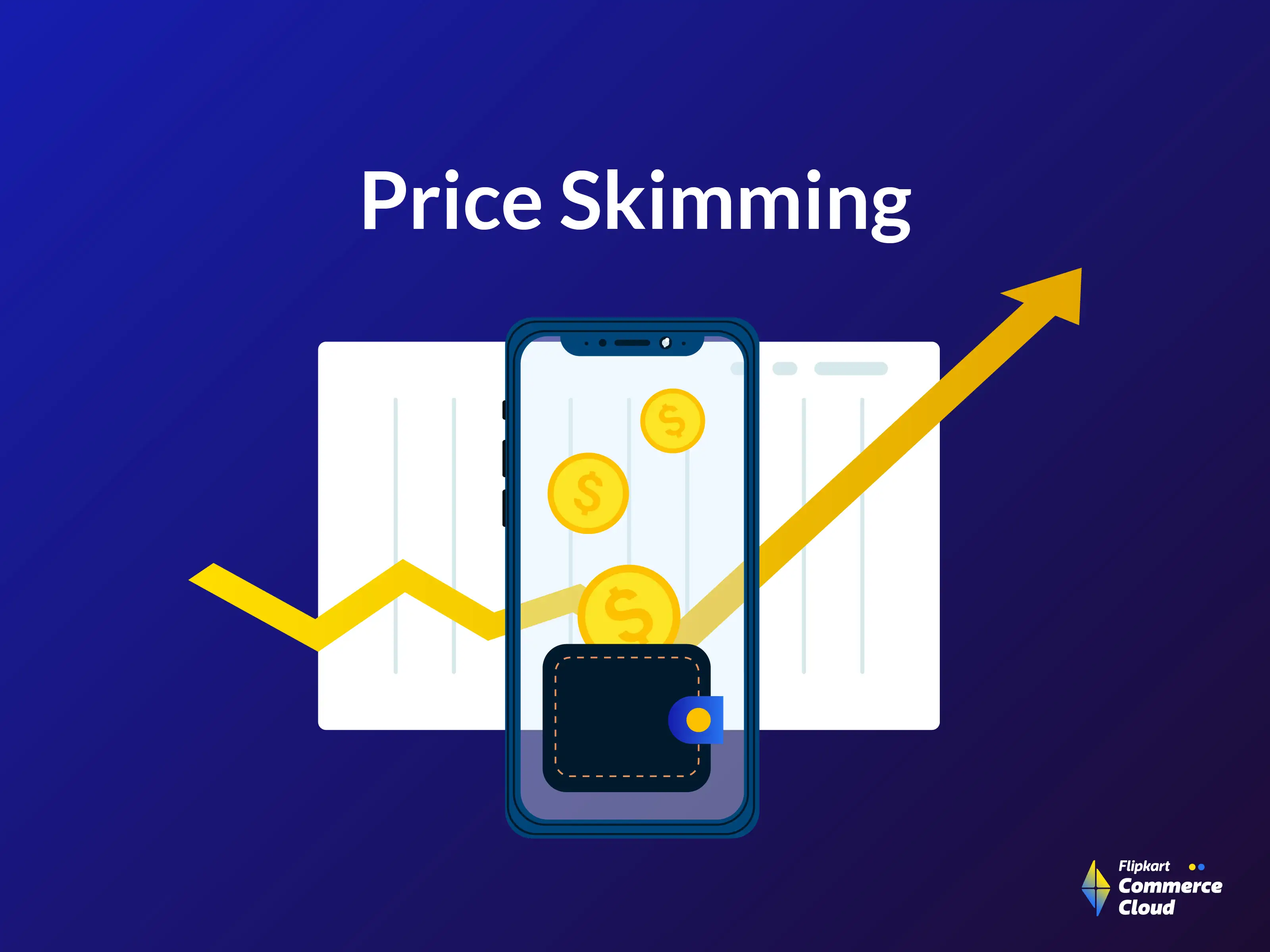
Everything About Price Skimming Strategy Explained
Read More
Mastering Pricing Strategy Framework
Read More
What is a High-Low Pricing Strategy?
Read More
Ultimate Guide To Dynamic Pricing Strategy In 2025
Read More
Retail Pricing Strategies: Winning with Promotion Pricing in Competitive Markets
Read More
Everything About Price Skimming Strategy Explained
Read More
Mastering Pricing Strategy Framework
Read More
What is a High-Low Pricing Strategy?
Read More
Ultimate Guide To Dynamic Pricing Strategy In 2025
Read More
Retail Pricing Strategies: Winning with Promotion Pricing in Competitive Markets
Read More